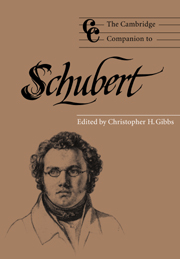Book contents
- Frontmatter
- Introduction: the elusive schubert
- Part I Contexts: musical, political, and cultural
- Part II Schuberts music: style and genre
- Part III Reception
- 13 German reception: Schubert's “journey to immortality”
- 14 Schubert's reception history in nineteenth-century England
- 15 Schubert's reception in France: a chronology (1828–1928)
- 16 Franz Schubert's music in performance: a brief history of people, events, and issues
- Notes
- Index
15 - Schubert's reception in France: a chronology (1828–1928)
from Part III - Reception
Published online by Cambridge University Press: 28 September 2011
- Frontmatter
- Introduction: the elusive schubert
- Part I Contexts: musical, political, and cultural
- Part II Schuberts music: style and genre
- Part III Reception
- 13 German reception: Schubert's “journey to immortality”
- 14 Schubert's reception history in nineteenth-century England
- 15 Schubert's reception in France: a chronology (1828–1928)
- 16 Franz Schubert's music in performance: a brief history of people, events, and issues
- Notes
- Index
Summary
At the same time as Schubert's fame started to spread across Europe during the late 1820s and 1830s, Paris rose to unprecedented heights as the Continent's foremost and busiest musical center. In spite of King Louis-Philippe's overt lack of interest in music (manifested in a complete absence of governmental support) the French capital became, more than it ever was, a place of intense rivalry between composers and performers from many different countries. Rossini and Meyerbeer (who had settled there before the July Revolution), Chopin, Liszt, and Wagner – to name but a few – bear witness to this extraordinary attraction. Particularly illustrative is the career of one of Schubert's champions, the Bohemian violin virtuoso Josef Slawjk (1806–33), who, unable to withstand such a competitive atmosphere, had to retreat to Vienna, obviously a less strenuous city.
Success in Paris could make the difference between international glory and recognition on a purely local level. The establishment of Schubert's fame, therefore, even though posthumous, necessitated the acknowledgment of the Parisian public. Hence the importance of retracing the history of Schubert's reception in France, more perhaps than in any other non-German country.
The historical process of discovering Schubert's musical output in France during the nineteenth century and up to the centenary of his death, falls roughly into four uneven periods.
- Type
- Chapter
- Information
- The Cambridge Companion to Schubert , pp. 263 - 269Publisher: Cambridge University PressPrint publication year: 1997
- 1
- Cited by

